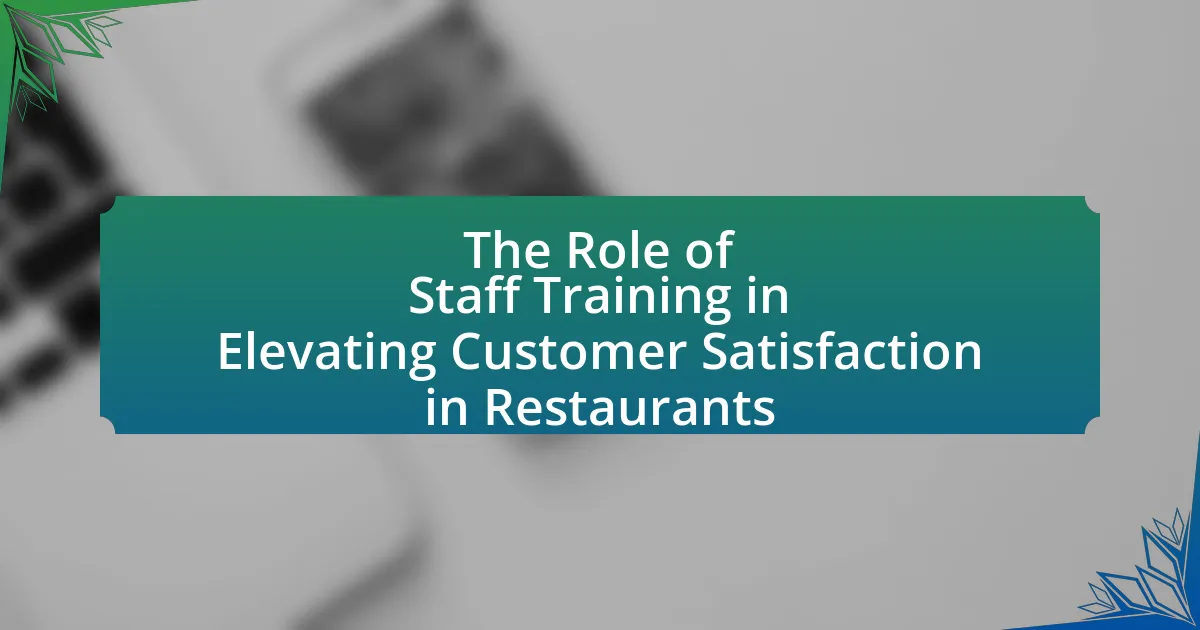The article focuses on best practices for handling customer complaints in the restaurant industry, emphasizing the importance of effective complaint resolution for maintaining customer satisfaction and loyalty. Key practices include actively listening to customers, acknowledging their concerns, providing prompt resolutions, and following up to ensure satisfaction. The article outlines the negative impact of unresolved complaints on a restaurant’s reputation and highlights the role of staff training and empowerment in improving complaint handling. Additionally, it discusses the use of technology and standardized procedures to enhance complaint resolution processes, ultimately fostering a customer-centric culture that encourages feedback and drives operational improvements.

What are the Best Practices for Handling Customer Complaints in the Restaurant Industry?
The best practices for handling customer complaints in the restaurant industry include actively listening to the customer, acknowledging their concerns, providing a prompt resolution, and following up to ensure satisfaction. Actively listening allows staff to fully understand the issue, while acknowledging the customer’s feelings demonstrates empathy. Providing a prompt resolution is crucial, as research shows that 70% of customers who have a complaint resolved quickly are likely to return. Following up reinforces the restaurant’s commitment to customer satisfaction and can turn a negative experience into a positive one.
Why is it important to address customer complaints effectively?
Addressing customer complaints effectively is crucial for maintaining customer satisfaction and loyalty. When complaints are handled well, businesses can turn negative experiences into positive outcomes, which can lead to repeat business and positive word-of-mouth referrals. Research indicates that 70% of customers who have a complaint resolved will return to the business, highlighting the importance of effective complaint resolution in retaining customers. Additionally, addressing complaints can provide valuable insights into operational weaknesses, allowing restaurants to improve their services and prevent future issues.
What impact do unresolved complaints have on a restaurant’s reputation?
Unresolved complaints significantly damage a restaurant’s reputation. When customers feel their issues are ignored, they are likely to share negative experiences online and through word-of-mouth, leading to a decline in customer trust and loyalty. Research indicates that 70% of unhappy customers will share their experiences with others, which can deter potential patrons. Additionally, a study by the American Express Global Customer Service Barometer found that 33% of customers would consider switching to a competitor after a single negative experience. Therefore, addressing complaints promptly is crucial for maintaining a positive reputation in the competitive restaurant industry.
How can effective complaint handling improve customer loyalty?
Effective complaint handling can significantly improve customer loyalty by demonstrating a commitment to customer satisfaction and fostering trust. When restaurants address complaints promptly and effectively, they show customers that their feedback is valued, which can lead to increased satisfaction and repeat business. Research indicates that 70% of customers who have a complaint resolved quickly are likely to return, highlighting the direct correlation between effective complaint resolution and customer retention. By implementing structured complaint handling processes, restaurants can not only resolve issues but also enhance the overall customer experience, ultimately leading to greater loyalty.
What are the key steps in the complaint handling process?
The key steps in the complaint handling process include receiving the complaint, acknowledging it, investigating the issue, resolving the complaint, and following up with the customer. Receiving the complaint involves actively listening to the customer’s concerns, which is crucial for understanding the issue. Acknowledging the complaint shows the customer that their feedback is valued and taken seriously. Investigating the issue requires gathering relevant information and facts to understand the root cause. Resolving the complaint involves providing a solution that satisfies the customer, which may include compensation or corrective actions. Finally, following up with the customer ensures that they are satisfied with the resolution and reinforces a positive relationship. These steps are essential for effective complaint management and customer satisfaction in the restaurant industry.
How should staff be trained to handle complaints?
Staff should be trained to handle complaints through structured role-playing scenarios and clear communication protocols. This training should include techniques for active listening, empathy, and problem-solving to ensure staff can effectively address customer concerns. Research indicates that employees who receive comprehensive training in complaint resolution are 30% more likely to achieve customer satisfaction compared to those who do not. Additionally, incorporating feedback mechanisms allows staff to learn from real-life experiences, further enhancing their skills in managing complaints effectively.
What role does active listening play in resolving complaints?
Active listening plays a crucial role in resolving complaints by ensuring that the complainant feels heard and understood. This practice involves fully concentrating, understanding, responding, and remembering what the customer is saying, which helps to clarify their concerns and emotions. Research indicates that effective communication, including active listening, can lead to a 70% increase in customer satisfaction when complaints are addressed properly. By validating the customer’s feelings and demonstrating empathy, active listening fosters trust and can transform a negative experience into a positive one, ultimately enhancing customer loyalty in the restaurant industry.
What tools and techniques can enhance complaint resolution?
Effective tools and techniques that can enhance complaint resolution in the restaurant industry include customer feedback management systems, staff training programs, and real-time communication channels. Customer feedback management systems, such as SurveyMonkey or Qualtrics, allow restaurants to gather and analyze customer complaints systematically, leading to actionable insights. Staff training programs focused on conflict resolution and customer service skills empower employees to handle complaints effectively, reducing escalation and improving customer satisfaction. Real-time communication channels, like live chat or social media platforms, enable immediate responses to complaints, fostering a sense of urgency and care that can significantly improve customer perceptions and loyalty. These methods collectively contribute to a more efficient and satisfactory complaint resolution process.
How can technology be utilized to track and manage complaints?
Technology can be utilized to track and manage complaints through the implementation of customer relationship management (CRM) systems, online feedback platforms, and mobile applications. CRM systems allow restaurants to log complaints, categorize them, and track resolution progress, ensuring that no issue is overlooked. Online feedback platforms, such as Yelp or TripAdvisor, enable customers to voice their concerns publicly, which can be monitored in real-time, allowing for prompt responses. Mobile applications can facilitate direct communication between customers and restaurant management, streamlining the complaint process and enhancing customer satisfaction. According to a study by the Harvard Business Review, companies that effectively manage customer complaints can increase customer retention by up to 70%, demonstrating the importance of utilizing technology in complaint management.
What are the benefits of having a standardized complaint resolution procedure?
A standardized complaint resolution procedure enhances consistency and efficiency in addressing customer grievances. This approach ensures that all complaints are handled uniformly, reducing the risk of bias and improving customer satisfaction. Research indicates that businesses with standardized procedures experience a 20% increase in customer retention rates, as customers feel their concerns are taken seriously and resolved promptly. Additionally, such procedures facilitate training for staff, enabling them to respond effectively and confidently to complaints, which further enhances the overall customer experience.

How can restaurants create a customer-centric culture?
Restaurants can create a customer-centric culture by prioritizing customer feedback and training staff to respond effectively to complaints. Implementing regular feedback mechanisms, such as surveys and comment cards, allows restaurants to understand customer needs and preferences. Additionally, training employees in active listening and conflict resolution equips them to handle complaints constructively, fostering a positive dining experience. Research indicates that businesses with strong customer-centric cultures see a 60% higher customer retention rate, demonstrating the effectiveness of these practices in enhancing customer satisfaction and loyalty.
What practices foster a positive environment for customer feedback?
Practices that foster a positive environment for customer feedback include actively soliciting input, ensuring staff responsiveness, and creating a welcoming atmosphere. Actively asking customers for their opinions through surveys or direct conversations encourages them to share their experiences. Staff responsiveness, where employees are trained to listen and address concerns promptly, reinforces the value of customer feedback. Additionally, a welcoming atmosphere, characterized by friendly service and a comfortable setting, makes customers feel appreciated and more likely to provide constructive feedback. These practices are supported by research indicating that businesses that engage with customers effectively see higher satisfaction rates and loyalty, as noted in studies by the Harvard Business Review.
How can staff empowerment improve complaint resolution?
Staff empowerment can significantly improve complaint resolution by enabling employees to make decisions and take actions that directly address customer issues. When staff members are empowered, they feel more responsible and motivated to resolve complaints effectively, leading to quicker resolutions and enhanced customer satisfaction. Research indicates that empowered employees are 60% more likely to provide exceptional service, as they can respond to customer needs without waiting for managerial approval. This autonomy allows for immediate action, reducing the time taken to resolve complaints and fostering a positive customer experience.
What role does management play in promoting a customer-centric culture?
Management plays a crucial role in promoting a customer-centric culture by establishing policies and practices that prioritize customer satisfaction. Effective management communicates the importance of customer focus throughout the organization, ensuring that all employees understand their role in enhancing the customer experience. For instance, management can implement training programs that emphasize empathy and active listening skills, which are essential for addressing customer complaints effectively. Research indicates that companies with strong customer-centric cultures, driven by management, experience higher customer loyalty and satisfaction rates, leading to increased profitability.
How can restaurants encourage customers to voice their complaints?
Restaurants can encourage customers to voice their complaints by creating a welcoming environment for feedback. This can be achieved through multiple channels, such as providing comment cards, implementing digital feedback systems, and training staff to actively solicit customer opinions during and after their dining experience. Research indicates that 70% of customers are more likely to provide feedback when they feel their opinions are valued, highlighting the importance of a responsive approach. Additionally, offering incentives, such as discounts or free items for completed surveys, can further motivate customers to share their experiences.
What methods can be used to solicit feedback from customers?
To solicit feedback from customers, restaurants can utilize methods such as surveys, comment cards, direct interviews, and digital feedback platforms. Surveys, often distributed via email or in-person, allow customers to provide structured feedback on their dining experience. Comment cards placed on tables enable immediate feedback during the visit. Direct interviews with customers can yield in-depth insights, while digital feedback platforms, such as social media and review sites, facilitate broader engagement and real-time responses. Research indicates that 70% of customers are more likely to provide feedback when asked directly, highlighting the effectiveness of these methods in gathering valuable customer insights.
How can anonymity in feedback encourage more honest complaints?
Anonymity in feedback encourages more honest complaints by reducing the fear of retaliation or negative consequences for the complainant. When customers know their identities are protected, they are more likely to express their true feelings and experiences without the worry of being judged or facing repercussions. Research indicates that anonymous feedback mechanisms can lead to a higher volume of responses, as individuals feel safer sharing their thoughts. For instance, a study published in the Journal of Consumer Research found that anonymity significantly increases the likelihood of providing critical feedback, as it fosters a sense of security and encourages openness. This results in more accurate insights into customer experiences, ultimately helping restaurants improve their services and address issues effectively.

What are common pitfalls in handling customer complaints?
Common pitfalls in handling customer complaints include failing to listen actively, providing inadequate responses, and not following up after resolution. Active listening is crucial; when staff do not fully engage with the customer’s concerns, it can lead to misunderstandings and further dissatisfaction. Inadequate responses, such as vague or dismissive answers, can exacerbate the situation, leaving customers feeling undervalued. Additionally, neglecting to follow up after a complaint is resolved can prevent the establishment from demonstrating commitment to customer satisfaction, which is essential in the restaurant industry for building loyalty and trust.
What mistakes should be avoided during the complaint resolution process?
During the complaint resolution process, it is crucial to avoid dismissing the customer’s feelings. Ignoring or belittling a customer’s concerns can escalate the situation and damage the relationship. Research indicates that 70% of customers who have a complaint resolved quickly and effectively are likely to return, highlighting the importance of acknowledging their emotions. Additionally, failing to follow up after resolving a complaint can lead to customer dissatisfaction; studies show that 63% of customers expect a follow-up after their issue is addressed. Lastly, not training staff adequately on complaint resolution techniques can result in inconsistent handling of complaints, which negatively impacts customer trust and loyalty.
How can dismissive attitudes negatively affect customer satisfaction?
Dismissive attitudes can significantly undermine customer satisfaction by making customers feel undervalued and ignored. When restaurant staff exhibit dismissive behavior, such as failing to acknowledge complaints or providing minimal responses, customers perceive a lack of care and attention to their concerns. Research indicates that 70% of customers who experience poor service do not return to the establishment, highlighting the direct correlation between dismissive attitudes and customer retention. Furthermore, a study published in the Journal of Service Research found that customers who feel their issues are dismissed are more likely to share negative experiences, impacting the restaurant’s reputation and future business.
What are the consequences of failing to follow up on complaints?
Failing to follow up on complaints can lead to significant negative consequences for a restaurant, including loss of customer trust and loyalty. When complaints are not addressed, customers may feel undervalued and ignored, which can result in negative word-of-mouth and a decline in repeat business. Research indicates that 70% of customers who have a negative experience will share it with others, potentially damaging the restaurant’s reputation. Additionally, unresolved complaints can lead to decreased employee morale, as staff may feel unsupported in addressing customer issues. This can further exacerbate service problems and contribute to a toxic work environment. Overall, neglecting to follow up on complaints can severely impact both customer satisfaction and the restaurant’s long-term success.
How can restaurants learn from customer complaints?
Restaurants can learn from customer complaints by systematically analyzing feedback to identify recurring issues and areas for improvement. By categorizing complaints into themes such as service quality, food taste, or cleanliness, restaurants can pinpoint specific operational weaknesses. Research indicates that 70% of customers who experience a negative interaction will return if their complaint is resolved effectively, highlighting the importance of addressing issues promptly. Additionally, implementing regular staff training based on complaint analysis can enhance service delivery and customer satisfaction, ultimately leading to improved business performance.
What strategies can be implemented to analyze complaint trends?
To analyze complaint trends effectively, restaurants can implement strategies such as categorizing complaints, utilizing data analytics tools, and conducting regular reviews of feedback. Categorizing complaints allows restaurants to identify common issues, such as service delays or food quality, which can be tracked over time. Utilizing data analytics tools enables the aggregation and visualization of complaint data, facilitating the identification of patterns and trends. Regular reviews of feedback, including monthly or quarterly assessments, help in recognizing shifts in customer sentiment and operational performance. These strategies are supported by research indicating that businesses that systematically analyze customer feedback can improve satisfaction rates by up to 20%.
How can feedback lead to improvements in service and menu offerings?
Feedback can lead to improvements in service and menu offerings by providing direct insights into customer preferences and experiences. When restaurants actively solicit and analyze customer feedback, they can identify specific areas where service may be lacking or where menu items do not meet expectations. For instance, a study by the National Restaurant Association found that 70% of customers are more likely to return to a restaurant that responds to their feedback, indicating that addressing concerns can enhance customer loyalty and satisfaction. By implementing changes based on this feedback, such as adjusting menu items or enhancing service protocols, restaurants can better align their offerings with customer desires, ultimately leading to improved performance and profitability.
What are practical tips for effectively handling customer complaints?
To effectively handle customer complaints, restaurants should actively listen to the customer, acknowledge their concerns, and provide a timely resolution. Active listening involves giving full attention to the customer, which helps in understanding the issue clearly. Acknowledging the complaint shows empathy and validates the customer’s feelings, which can diffuse tension. Providing a timely resolution is crucial; research indicates that 70% of customers who have a complaint resolved quickly are likely to return. Additionally, training staff on complaint resolution techniques can enhance their ability to manage difficult situations effectively.
How can staff maintain professionalism during difficult interactions?
Staff can maintain professionalism during difficult interactions by actively listening to the customer, remaining calm, and using respectful language. Active listening allows staff to fully understand the customer’s concerns, which can de-escalate tension. Remaining calm helps to prevent the situation from escalating further, as emotional reactions can exacerbate conflicts. Using respectful language demonstrates a commitment to resolving the issue and fosters a positive atmosphere, even in challenging situations. Research indicates that effective communication and emotional regulation are key components in conflict resolution, which supports the importance of these practices in maintaining professionalism.
What follow-up actions can reinforce a positive customer experience after a complaint is resolved?
Follow-up actions that can reinforce a positive customer experience after a complaint is resolved include sending a personalized thank-you message, offering a discount or complimentary item on a future visit, and conducting a follow-up call or email to ensure satisfaction. Personalized thank-you messages show appreciation and acknowledge the customer’s feedback, which can enhance their loyalty. Offering discounts or complimentary items can incentivize customers to return and demonstrate that the restaurant values their patronage. Additionally, follow-up communications can provide an opportunity to gather further feedback, reinforcing the restaurant’s commitment to customer satisfaction. According to a study by the Harvard Business Review, effective follow-up can increase customer retention rates by up to 30%.




